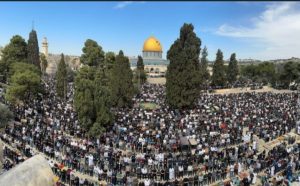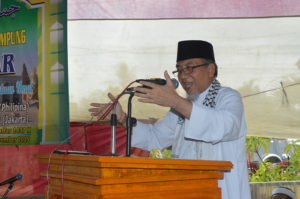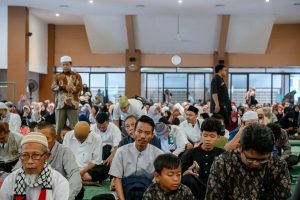By: Ali Farkhan Tsani, Senior Editor of MINA News Agency
Tracing historical traces, the hijrah phase of the Prophet Muhammad sallallaahu ‘Alaihi Wasallam and his companions was an early era of Islamic revival, which was initially covered by an atmosphere and situation that was not conducive in Mecca to a prospective atmosphere in Medina.
Ibn Qayyim Al-Jauziyyah referred to the Prophet’s migration as al-hijrah al-haqiqiyyah (true migration). The reason is the physical migration as well as a reflection of the meaningful hijrah itself.
The two meanings of the hijrah are simultaneously summarized in the migration of the Prophet sallallaahu ‘alaihi wasallam and his companions to Medina.
Also Read: Verses of the Universe in Gaza: The Unyielding Light of Faith
In food (physical), they walk from Mecca to Medina, through the desert as far as approximately 450 km. It is also clear that they emigrated for the sake of maintaining the Islamic mission.
Indeed, in developing the message of divine da’wah, the prophets of Allah’s messengers did hijrah dynamically from one place to another. Among them is Prophet Ibrahim ‘Alaihis Salam.
Prophet Ibrahim ‘Alaihis Salam even made a physical migration several times, from his homeland in Babylonia (Iraq) to Palestine. Then from Palestine to Egypt, from Egypt back to Palestine again.
Including, the migration of Prophet Ibrahim from Palestine to Mecca which in its development became the hajj shari’a. Back again to Palestine, continued back to Mecca.
Also Read: Prophet Sulaiman Alaihi Salam, the Greatest Muslim King of All Time
Prophet Musa ‘Alaihis Salam also received orders from Allah to emigrate from the land of Pharaoh in Egypt to the Palestinian border, through Jordan. (Surat al-Qashash [28]: 20-21).
A journey to build civilization in the spirit of loyalty, faithfulness, faith, and obedience that leads to something better for the pleasure of Allah.
Hijrah in a broad sense is moving from things that Allah has forbidden to things that He has commanded. Hijrah from redundant and mafsadat (damaging) actions, towards more useful good deeds.
The point is that hijrah leaves everything that Allah has forbidden to what Allah has commanded. As the Prophet sallallaahu ‘alaihi wasallam said:
Also Read: Imaam Yakhsyallah Mansur: Surah At-Tin Indicates the Command to Liberate Al-Aqsa
الْمُسْلِمُ مَنْ سَلِمَ الْمُسْلِمُونَ مِنْ لِسَانِهِ وَيَدِهِ وَالْمُهَاجِرُ مَنْ هَجَرَ مَا نَهَى اللَّهُ عَنْهُ
Meaning: “A Muslim is a person who makes other Muslims feel safe from his tongue and hands (his actions). Meanwhile, muhajir (people who migrate) are people who leave everything that Allah has forbidden. (HR Muttafaqun ‘Alaih).
Thus, the Prophet sallallaahu ‘Alaihi Wasallam and his companions have fought sadness and fear by emigrating, even though they had to leave their homeland, relatives and property they loved. However, Allah, His Messenger, and jihad fi sabilillah are more beloved than all the allures of the world.
They really enjoy how to practice the verse:
Also Read: Imaam Yakhsyallah: Nurture Love for the Prophet, One Will Be with Whom One Loves
قُلْ إِنْ كَانَ آبَاؤُكُمْ وَأَبْنَاؤُكُمْ وَإِخْوَانُكُمْ وَأَزْوَاجُكُمْ وَعَشِيرَتُكُمْ وَأَمْوَالٌ اقْتَرَفْتُمُوهَا وَتِجَارَةٌ تَخْشَوْنَ كَسَادَهَا وَمَسَاكِنُ تَرْضَوْنَهَا أَحَبَّ إِلَيْكُمْ مِنَ اللَّهِ وَرَسُولِهِ وَجِهَادٍ فِي سَبِيلِهِ فَتَرَبَّصُوا حَتَّىٰ يَأْتِيَ اللَّهُ بِأَمْرِهِ ۗ وَاللَّهُ لَا يَهْدِي الْقَوْمَ الْفَاسِقِينَ
Meaning: “Say: if your fathers, children, brothers, wives, your family, the wealth that you cultivate, the business that you are afraid of losing, and the houses that you like, are more dear to you from Allah and His Messenger and (from) jihad in His way, so wait until Allah brings His judgment. And Allah does not guide the wicked.” (Q.S. At-taubah [9]: 24).
Even greater is the migration from division to unity, and from conflict to brotherhood.
This is as exemplified by the Prophet sallallaahu ‘alaihi wasallam when he emigrated.
Also Read: Friday Sermon: Emulating the Firmness of the Prophet in Struggle
The first step he took after building a mosque as a center for the struggle of the Muslims, was to bring the immigrants (Muhajirin) together with the natives (Ansar).
The purpose of his holding the brotherhood is, to:
(1) eliminating the foreign feeling in the friends of the Emigrants in the new area, namely the city of Medina,
(2) build a sense of brotherhood among each other in the religion of Allah,
Also Read: Imaam Yakhsyallah: Muslims Unity as Key to Victory of Islam
(3) so that each other can help each other, the strong help the weak, those who are able to help the needy, and so on.
The spirit of brotherhood among believers in Allah is emphasized in the Qur’an:
إِنَّمَا الْمُؤْمِنُونَ إِخْوَةٌ فَأَصْلِحُوا بَيْنَ أَخَوَيْكُمْ ۚ وَاتَّقُوا اللَّهَ لَعَلَّكُمْ تُرْحَمُونَ
Meaning: “Indeed the believers are brothers, so make peace between your two brothers and fear Allah so that you may receive mercy. (Surat al-Hujurat [49]:10).
Also Read: Friday Sermon: Prophet Muhammad Is Not a Political Figure
يَا أَيُّهَا الَّذِينَ آمَنُوا اتَّقُوا اللَّهَ حَقَّ تُقَاتِهِ وَلَا تَمُوتُنَّ إِلَّا وَأَنْتُمْ مُسْلِمُونَ. وَاعْتَصِمُوا بِحَبْلِ اللَّهِ جَمِيعًا وَلَا تَفَرَّقُوا ۚ وَاذْكُرُوا نِعْمَتَ اللَّهِ عَلَيْكُمْ إِذْ كُنْتُمْ أَعْدَاءً فَأَلَّفَ بَيْنَ قُلُوبِكُمْ فَأَصْبَحْتُمْ بِنِعْمَتِهِ إِخْوَانًا وَكُنْتُمْ عَلَىٰ شَفَا حُفْرَةٍ مِنَ النَّارِ فَأَنْقَذَكُمْ مِنْهَا ۗ كَذَٰلِكَ يُبَيِّنُ اللَّهُ لَكُمْ آيَاتِهِ لَعَلَّكُمْ تَهْتَدُونَ
Meaning: “O you who believe, fear Allah, truly fear Him; and never die unless you are Muslim. And hold on all of you to the rope [of religion] Allah while in congregation, and do not be divided, and remember Allah’s favor on you when you were enemies [in the Jahiliyah period], so Allah united your hearts, then became you because of Allah’s favor those who are brothers; and you were on the brink of hell, then Allah saved you from it. Thus Allah explains His verses to you, so that you may be guided.” (Surat Ali Imran [3]: 102-103).
That is the meaning of hijrah in relation to Islamic brotherhood. Hopefully, the presence of the New Year of 1444 Hijriyah is able to foster optimism in the struggle to build community civilization based on the values of Islamic brotherhood. Amen. (T/RE1)
Mi’raj News Agency (MINA)
Also Read: Without Knowledge, Congregation Is Merely a Crowd Without Direction











![Israeli tanks and APC’s gather by the Israeli – Lebanese border. Amid Israel’s escalating campaign against Hezbollah in Lebanon on September 30, 2024. [Erik Marmor/Getty Images]](https://en.minanews.net/wp-content/uploads/2024/10/IMG_20241001_203226-300x197.jpg)





















 Mina Indonesia
Mina Indonesia Mina Arabic
Mina Arabic